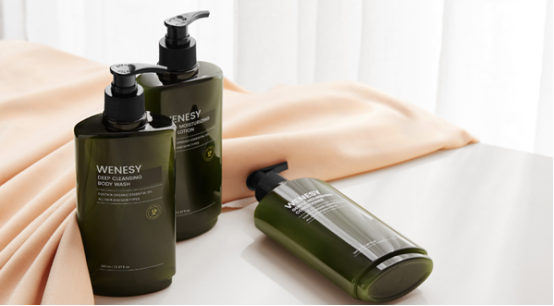In today’s competitive hospitality industry, hotels are constantly seeking ways to reduce operational costs without compromising guest satisfaction. One area that has historically been overlooked is bathroom amenities, particularly shampoo, conditioner, and shower gel supplies. Traditional single-use miniature bottles not only generate enormous waste but also incur hidden operational costs.
Enter shampoo dispensers—wall-mounted, refillable systems that transform the way hotels manage bathroom amenities. These dispensers provide a sustainable, cost-effective solution while enhancing hygiene, guest experience, and operational efficiency.
Purchasing bulk refill products for dispensers is significantly cheaper than buying thousands of miniature bottles annually:
· Cost per liter comparison: Bulk shampoo can cost as little as 20–30% of the price per milliliter of mini-bottles.
· Volume discounts: Suppliers offer lower rates for bulk containers, further reducing procurement expenses.
· Fewer deliveries: Larger packs mean fewer orders, reducing shipping costs and administrative overhead.
For hotels with hundreds or thousands of rooms, these savings accumulate rapidly over the year.

Housekeeping staff spend a considerable portion of their time restocking miniature bottles. Dispensers reduce this labor burden:
· Fewer refills: A single dispenser may replace 50–100 mini-bottles, reducing daily replenishment tasks.
· Simplified maintenance: Cartridge-based or top-fill dispensers allow refills in seconds, compared to unpacking and distributing multiple bottles.
· Streamlined operations: Staff can focus on cleaning and room preparation rather than constant inventory handling.
This efficiency translates into measurable labor cost reductions and faster room turnover.
Overfilling, spillage, and underutilized mini-bottles result in significant product loss. Dispensers address these issues:
· Controlled dispensing: Push-button or sensor systems release a precise amount per use.
· No excess packaging: Bulk containers reduce wasted packaging material.
· Long shelf life: Refillable cartridges are often sealed to prevent contamination, maintaining product quality.
By reducing wastage, hotels optimize their purchasing and cut unnecessary expenses.
Miniature bottles occupy considerable storage space and require careful inventory management:
· Compact bulk containers: Dispensers and refill packs take less room in storage closets.
· Simplified inventory tracking: Fewer items make stocktaking faster and less error-prone.
· Predictable usage: Dispensers allow better estimation of product needs based on occupancy, reducing overstock or shortages.
Efficient storage directly lowers facility costs and administrative effort.
High-quality dispensers are designed for long-term use, providing value far beyond the lifespan of disposable bottles:
· Robust materials: Stainless steel, ABS plastic, or aluminum withstand frequent use and cleaning.
· Long-lasting design: Dispensers can remain in service for 5–10 years with minimal maintenance.
· Reduced replacement frequency: Fewer product containers and dispensers mean lower recurring expenses.
Hotels gain sustainable long-term savings while maintaining premium service quality.
Efficient dispensers contribute indirectly to cost savings by reducing complaints and replacements:
· Consistent availability: Guests always have access to shampoo and conditioner.
· Clean and hygienic: Touchless or sealed systems prevent mess and contamination.
· Professional appearance: Sleek dispensers convey quality, reducing complaints about untidy mini-bottles or empty supplies.
Fewer guest complaints mean less staff time addressing issues and improved overall guest satisfaction scores.
Environmental responsibility is increasingly linked to operational efficiency:
· Reduced plastic waste: Dispensers eliminate thousands of small bottles, reducing landfill and recycling costs.
· Eco-certifications: Many bulk products are biodegradable, supporting hotel sustainability certifications.
· Brand appeal: Sustainable amenities can attract eco-conscious travelers, boosting occupancy and revenue.
Sustainability initiatives often have indirect financial benefits, including marketing advantages and cost reductions.
Several global hotel chains have successfully implemented dispensers with measurable cost savings:
· Luxury Urban Hotel: Installed stainless steel, touchless dispensers in 300 rooms. Resulted in a 25% reduction in annual amenity costs and lower housekeeping labor hours.
· Boutique Resort: Adopted refillable multi-product dispensers for shampoo, conditioner, and body wash. Reduced mini-bottle purchases by over 90%, saving thousands of dollars per year.
· Business Hotel Chain: Standardized dispenser cartridges across all properties, improving procurement efficiency and inventory predictability.
These examples show how dispensers combine operational efficiency, cost reduction, and sustainability into a single solution.
· Customizable and branded dispensers: Hotels can match bathroom aesthetics and reinforce brand image.
· Multi-function units: Combined shampoo, conditioner, and body wash dispensers reduce installation points and maintenance needs.
· Smart monitoring integration: Some dispensers now include sensors to track usage, further reducing waste and improving inventory planning.
These features enhance long-term operational efficiency while delivering a superior guest experience.
Shampoo dispensers are more than a sustainable amenity—they are a strategic investment in operational efficiency. By reducing procurement, labor, product waste, and storage costs, dispensers significantly cut long-term operating expenses while supporting environmental responsibility and guest satisfaction.
Hotels that adopt durable, refillable dispensers achieve measurable financial savings while contributing to a greener, cleaner hospitality environment.
Weney provides premium wall-mounted shampoo dispensers and eco-friendly bathroom products, enabling hotels to reduce operational costs and enhance guest experience simultaneously.
Feature | Single-Use Mini Bottles | Wall-Mounted Shampoo Dispensers |
Procurement Cost | High – frequent small orders | Low – bulk refills, volume discounts |
Housekeeping Labor | High – daily restocking | Low – fewer refills, faster maintenance |
Plastic Waste | Very high – discarded after partial use | Very low – bulk refill reduces packaging |
Inventory & Storage | Requires large storage space | Compact, easier stock management |
Durability | Single-use only | Long-lasting, multi-year use |
Guest Satisfaction | Moderate – mini bottles may run out | High – consistent supply, hygienic, sleek design |
Operational Efficiency | Low – repetitive tasks and logistics | High – simplified refills, predictable usage |
Sustainability | Low – difficult to recycle, high environmental footprint | High – reduces waste, supports eco-certifications |
Relation Products
Wenesy Cosmetics Ltd.
Copyright © Wenesy Cosmetics Ltd. Sitemap